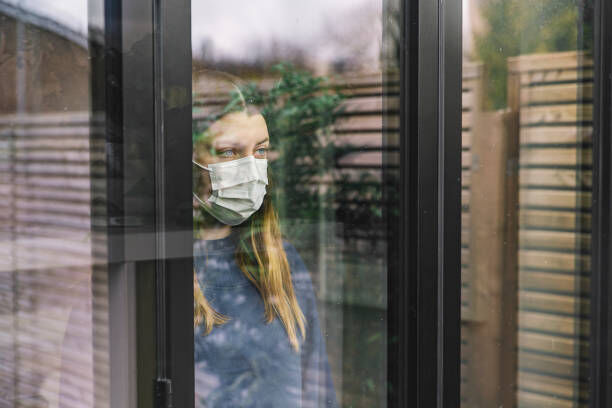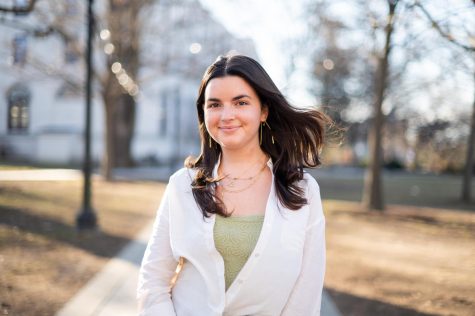Lecture Series Highlights Mental Health Amid Pandemic
Courtesy of Justin Paget, Getty Images.
“The Emotional Journey of Many Individuals and Families During the Pandemic” focused on the pandemic’s affect on mental health.
February 24, 2021
On Feb. 18, members of the University community gathered virtually for the second installment of this year’s Naratil Family Health and Human Values Lecture Series, entitled “The Emotional Journey of Many Individuals and Families During the Pandemic” presented by Linda Carman Copel.
Evie Lengetti, Assistant Dean of Continuing Education and Assistant Professor for the Fitzpatrick College of Nursing, opened the evening’s program by introducing Copel and the goals for the broader lecture series.
“In this series, we are looking to explore some of the issues and challenges as people construct and reconstruct their lives during and after this pandemic,” Lengetti said.
The series has been an annual tradition within the College of Nursing at Villanova since 1994, focusing on a particular critical health theme or issue that is relevant in that academic year. Fittingly, the 2020-21 series surrounds the varied effects of the coronavirus pandemic and is titled “The Face of COVID-19: A Look at the Impact on the Person Beyond the Disease and Its Symptoms.”
This particular lecture, one of three in the series, focused on the pandemic’s effect on mental health at the individual and familial levels. Lengetti outlined Copel’s expertise in mental health issues and treatment, noting her degrees and certifications in counseling, family counseling and bereavement counseling, among others, as well as her past published research focused on family and women’s issues.
Copel, who also works as a professor at the University within the College of Nursing, opened her lecture with a dedication acknowledging and thanking those who have made her research and work possible.
“The work that I do is really the result of the work that other people do,” Copel said, emphasizing the important role her colleagues and patients have played in her analysis of public mental health during the pandemic and beyond.
Copel introduced the objective of her lecture as two-fold: to present the prevalent challenges of mental health caused by the pandemic and outline recommendations to assist in facing these issues.
For context, she explained the broad mental health trends seen throughout the pandemic both globally and here in the United States. Citing reports from the World Health Organization and U.S. Centers for Disease Control, Copel described the current state of mental health around the world as rather bleak. There are disruptions to existing mental health services in 93% of countries within the WHO and underfunding of those services compounded by the emergence of COVID-19.
Turning to the specific issues concerning our nation and community, Copel emphasized loneliness and loss as major contributors to the apparent rise in depression and anxiety, substance abuse disorders and other mental health concerns.
“We now know that loneliness is of great clinical concern,” she said, adding that recent research has implicated loneliness as a certain “antecedent to depression.”
Likewise, Copel discussed the similar and related role of loss during the pandemic. She highlighted that loss, in this context, is more broadly defined than strictly loss of life (of a loved one, for example). The concept also extends to the loss of “contexts,” as Copel put it, or those norms and routines around which we based our lives pre-pandemic.
“We are actually living grief daily,” Copel explained, pointing out the confusing, disorienting and stressful nature of life in the past year, further complicated by the fact that there is no clear end in sight for this new way of life.
Copel pointed to effects of these feelings of loneliness, grief and loss, particularly discussing their correlation with increased rates of depression, anxiety and emotional and physical exhaustion. This exhaustion, which she noted has also been commonly dubbed as “inner weariness” or “pandemic fatigue” by patients and professionals, is tied to unrelenting stress and grief during the pandemic and is worsened by the common public aversion to seek help.
“We still see that many people see asking for help as a sign of weakness, when it’s just the opposite—it’s a sign of strength,” she said.
Additionally, Copel expounded on the rise in anger seen as a result of the pandemic, which has been observed by counselors across the country. Particularly, she explained that feelings of lack of control, stress and uncertainty lead many toward anger more frequently than under normal circumstances. She emphasized this effect’s importance in connection to conflict and violence in relationships—romantic, familial or otherwise.
Beyond simply presenting issues, Copel also discussed ways counselors, healthcare professionals and members of the wider public can approach and overcome these challenges. She presented strategies to combat loneliness and grief, like TEAR and REAL, which are centered around acknowledgement, self-analysis and eventually moving past mental health challenges.
She also cited ways to identify, de-escalate and prevent relationship and family conflict, including the THINK strategy and conflict resolution behaviors like communication, empathy, calmness, role-modeling and remaining hopeful, among others.
Copel reaffirmed the importance of discussing mental health issues to bring greater visibility and reduce stigmas, as well as the significance of making efforts to seek and provide connection amid pandemic-driven isolation.
“Just some interaction, reaching out, can make such a positive impact,” she said.
Following Copel’s lecture, participants joined in a live virtual Q&A and discussion of her talk with a panel of experts in the areas of family, relationship and broader mental health issues. In this discussion, participants worked to further unpack the diverse, complicated effects of COVID-19 on mental health of individuals and among family units.
This year’s Naratil Family Health and Human Values Lecture Series’ final installment will take place April 15 and will focus on ways the pandemic has revealed and magnified disparities in the public health system. As with all lectures in the series, it will be free and open to the public.



